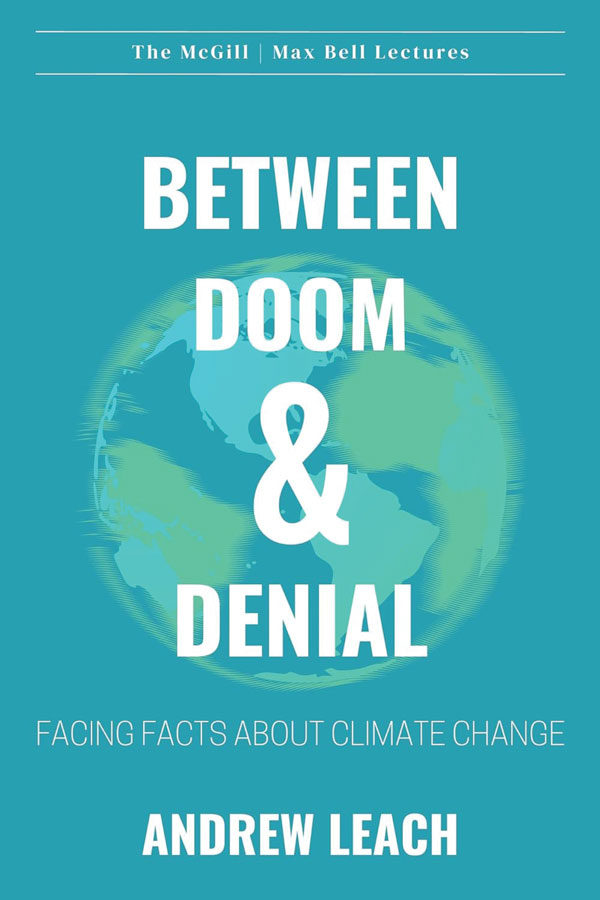Climate change is “the environmental, political and societal challenge of our time,” writes Andrew Leach in Between Doom & Denial. This slim, clearly written book was published in conjunction with the author’s talks for the inaugural McGill/Max Bell Lecture in 2023. Acknowledging that global warming is “mostly human-caused,” Leach notes that climate change “is a challenge to which we, as Canadians, have not always responded with best efforts and grand ideas.” Just the opposite: “Too often, our discussions of climate change devolve into denial or countervailing promises of doom,” he writes, with both sides resorting to “half-truths, lies by omission and too-clever-by-half excuses” to bolster their take. Leach isn’t having it—the mendacity in the public square—and wrote the book to confront “the most pervasive and/or insidious lies and half-truths that permeate the climate change debate in Canada today.”
An energy and environmental economist and a professor at the University of Alberta, Leach titles each chapter with a “half-truth” that he wants to confront, such as chapter two: “Climate change will not be that bad, and we can adapt.” To the argument that climate change will be just fine because of the benefits of longer growing seasons, increased agricultural productivity, tourism, and lower heating costs due to warmer temperatures, Leach counters by pointing to the huge increase in wildfires in recent years. He also alludes to the pine beetle infestations that decimated our forests, amplifying fire weather and wildfire smoke that increases the use of air conditioners and decreases solar power generation. And, not least, global political crises and mass migrations linked to climate change impact Canada in myriad ways. Instead of “adaptation”—as proposed by “self-described climate skeptic Bjorn Lomborg”—Leach advocates for mitigation. This will not be easy. “Climate change mitigation is the purest of public goods,” he writes, in that the whole world benefits, but “there is limited incentive for any individual nation to mitigate its emissions, since it can enjoy the benefits of others’ mitigation efforts. The economic incentives tell us to free ride and wait for others to act.” Still, “technologies such as renewable electricity, electric vehicles and heat pumps” are improving and “the list of cost-effective mitigation efforts will get longer each year.” This “gives us a fighting chance,” he writes, quoting climate scientist Katherine Hayhoe: “The difference between a higher versus a lower emissions future is nothing less than the survival of our civilization.”
In chapter four, “Canada accounts for less than 2 per cent of the world’s emissions,” Leach dismantles the idea that a carbon tax in Canada will not have a significant impact, as Canada is responsible for only 1.6 per cent of global emissions. He counters that Canada ranks fourth in the G20 countries on a GHG emissions per capita basis. Thus he projects carbon pricing as the best policy to reduce emissions, even though he has also argued for government procurement of renewable energy and the phasing out of coal-fired power. Additionally, he emphasizes stringency of “policies, not targets,” as Canada often promises outcomes it cannot guarantee.
In other chapters, Leach dismisses as irrelevant the idea that there will always be demand for Canadian oil and gas. “What will matter much more than how oil and gas are used is how much the world is willing to pay for fossil fuels,” he writes. “Global energy prices will decline in a world acting on climate change [and] Canadians could be left with both economic calamity and a large, unfunded environmental cleanup.” Alternatively, “in the event that climate action slows,” we will face “a world with too little oil and gas production capacity facing high prices.” Not to mention the damage done from doing little to mitigate the issue.
For those looking to solar and wind power as a panacea for climate change, Leach cautions that “the problem with renewable energy in Canada is not sunsets, it is winter.” Neither solar nor wind energy provide reliable capacity, he argues, because expensive seasonal storage is required for renewable energy. As such, he warns against superimposing the US experience with renewable energy onto our “cold country,” instead arguing for transmission lines to facilitate sharing hydro, nuclear and renewable energy across Canada.
In contrast to economist Jim Stanford—who does not view energy transition as unique and is optimistic other industries can replace the oil and gas industry—Leach argues that transitioning away from oil and gas has no precedent. In other cases, such as the phase-out of coal in Alberta, Ontario or Germany, or of oil and gas in Denmark, those industries were already in decline locally, he asserts, whereas in Alberta the oil and gas sector is a “huge wealth and government revenue generator” that cannot be replicated by government programs.
“The world will still use oil and gas for decades to come, but that provides little assurance that our fossil fuel industries will not be affected by action on climate change,” concludes Leach. “Oil and gas demand is on a collision course with action on climate change, and the more we look to hide behind solutions like carbon capture and storage, the more likely we are to fail to plan for the much larger challenges we face in the coming transition.” On that front, he writes, “While some are quick to imagine that government action can create new industries to replace lost jobs, wages and tax revenues, and provide a just transition away from fossil fuels, the reality is that the coming energy transition will be unprecedented, painful and costly to many here in Canada even as it will also have substantial global benefits.”
Between Doom & Denial will likely please no one. But everyone should read it. Especially policy makers. “The hard truths of climate change” mean that almost every government policy “from infrastructure to housing to fiscal policy” is now a climate change policy, Leach writes. It’s time to act accordingly. n
Junaid bin Jahangir is an associate professor of economics at MacEwan University in Edmonton.
_______________________________________


